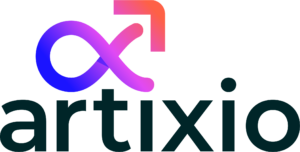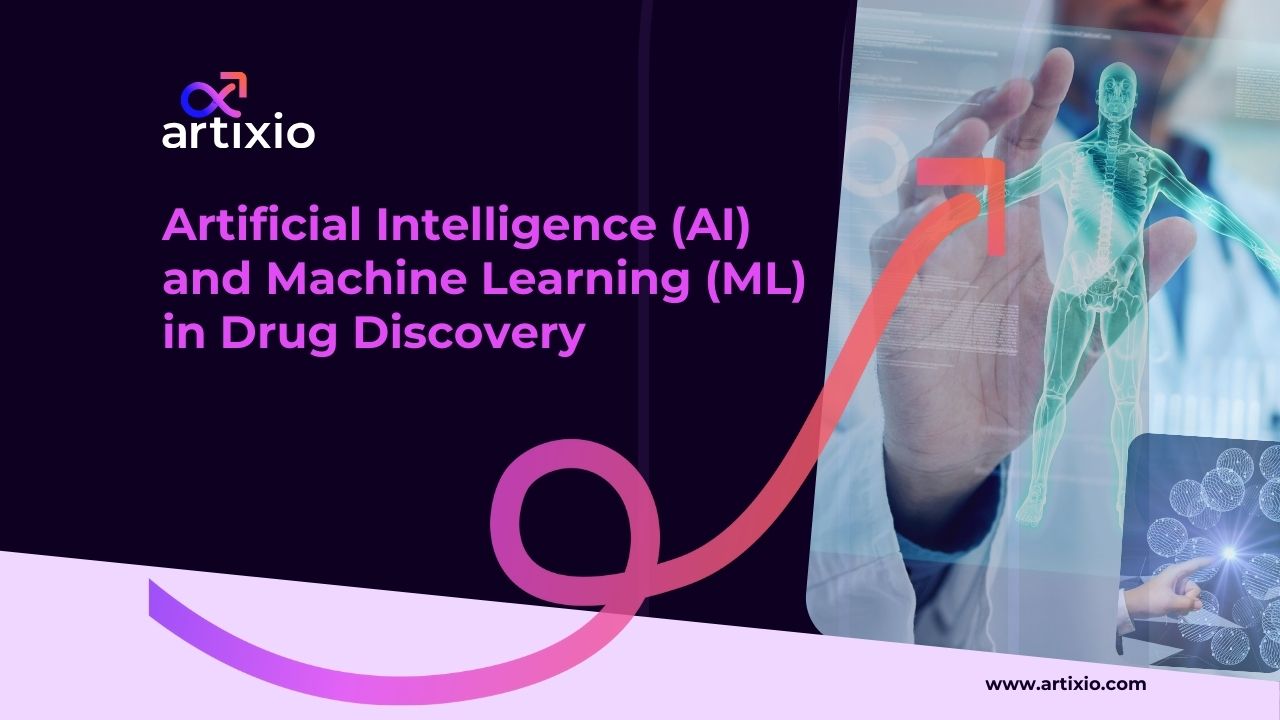Artificial Intelligence (AI) and Machine Learning (ML) in drug discovery offer new possibilities for accelerating the drug development and improving the precision of therapeutics. Traditionally, drug discovery has been a time-consuming and costly process, often taking years and billions of dollars to bring a single drug to market. With these innovative tools, the landscape of drug discovery is undergoing a significant transformation enabling faster, efficient, and innovative approaches to drug discovery process.
AI Market Size and growth
In 2023, the global market for AI in drug discovery was valued at approximately $1.5 billion to $2 billion. This includes investments in AI-driven drug discovery platforms, collaborations between pharmaceutical companies and AI startups, and internal AI initiatives by major pharma companies.
The market is projected to grow at a compound annual growth rate (CAGR) of 30% to 40% over the next decade, reaching a value of around $8 billion to $10 billion by 2030.
AI and ML Impact on Pharma Industry
The use of AI and machine learning is quietly changing how pharma teams work every day — from research to regulatory planning. This blog looks at real ways these technologies are making an impact on pharmaceuticals.
i. Acceleration of Drug Discovery Processes
i. Target Identification and Validation
ii. Lead Compound Discovery
iii. Optimization of Lead Compounds
ii. Reduction in Costs and Time
i. Clinical Trial Design and Optimization
iii. Improved Precision and Personalization
i. Biomarker Discovery
iv. Innovation in Drug Design
v. Enhancement of Existing Drug Pipelines
i. Repurposing Existing Drugss
vi. Collaboration and Open Innovation
vii. Integration of Multi-Omics Data
viii. Ethical and Regulatory Considerations
ix. Shift Towards Data-Driven Decision Making
To see how technology is shaping smarter compliance decisions, explore our Regulatory Intelligence Solutions
Top Industry Leaders Utilizing AI and ML in Pharmaceutical Drug Innovation
1. Pfizer
Pipeline Focus: Pfizer uses AI to enhance drug discovery across multiple therapeutic areas, including oncology, immunology, and rare diseases. AI is integrated into the discovery of both small molecules and biologics.
AI Collaborations: Pfizer collaborates with IBM WatsonX aiming at new target identification and CytoReason to develop AI-driven tools for predicting drug efficacy and safety. Their collaboration with XtalPi focuses on AI-driven molecular modeling.
Pipeline Drugs: Pfizer’s AI-accelerated pipeline includes drugs like PF-06463922 (lorlatinib) for lung cancer.
2. Novartis
Pipeline Focus: Novartis is integrating AI into its drug discovery pipeline, focusing on oncology, cardiology, and ophthalmology. AI is used in target identification, lead optimization, and clinical trial design.
AI-Driven Drug Development: Novartis has an ongoing partnership with Microsoft to implement AI solutions across their R&D efforts.
Example Pipeline Drugs: Novartis is using AI to accelerate the development of drugs like LNP023 (ipkizumab) for complement-driven diseases and Tisagenlecleucel (Kymriah) for CAR-T cell therapy in cancer.
3. Merck & Co.
Pipeline Focus: Merck leverages AI for oncology, infectious diseases, and vaccines. AI aids in early drug discovery, biomarker identification, and clinical trial optimization.
Collaboration with AI Startups: Merck collaborates with AI startups BenevolentAI for target identification and lead optimization & Exscientia and Atomwise for drug discovery.
Example Pipeline Drugs: AI has supported the development of Merck’s MK-4482 (molnupiravir) for COVID-19 and V920 (Ebola vaccine).
4. AstraZeneca
Pipeline Focus: AstraZeneca applies AI in oncology, respiratory, and cardiovascular diseases. AI-driven insights are used to optimize molecular structures and predict clinical outcomes.
Collaborative Efforts: AstraZeneca has partnered with BenevolentAI, an AI company, to enhance their drug discovery process.
Example Pipeline Drugs: Tagrisso (osimertinib) for lung cancer and Calquence (acalabrutinib) for blood cancer are part of AstraZeneca’s AI-enhanced pipeline.
5. Johnson & Johnson (Janssen)
Pipeline Focus: Janssen uses AI in immunology, oncology, and neuroscience. AI helps in patient stratification and clinical trial design.
AI Collaborations: J&J collaborates with AI-driven companies like Tempus and Owkin to integrate AI into their drug discovery and development processes.
Example Pipeline Drugs: RYBREVANT™ (amivantamab) for lung cancer and TREMFYA (guselkumab) for psoriasis are examples where AI has influenced development.
6. Sanofi
Pipeline Focus: Sanofi uses AI to develop treatments in oncology, immunology, and rare diseases. AI aids in identifying new drug candidates and optimizing existing ones.
AI Partnerships: Sanofi has partnered with companies like Exscientia to develop AI-designed drug candidates and with BERG for AI-driven biomarker discovery.
Example Pipeline Drugs: Dupixent (dupilumab) for atopic dermatitis and SAR442720 (THOR-707), a next-generation IL-2 therapy for cancer, are in Sanofi’s AI-accelerated pipeline.7. GSK (GlaxoSmithKline)
7. GSK (GlaxoSmithKline)
Pipeline Focus: GSK focuses on AI-driven drug discovery in oncology, infectious diseases, and respiratory diseases. AI tools are used for target identification and drug design.
AI Collaborations: GSK collaborates with AI companies like Insilico Medicine and with the University of California to integrate AI into its discovery processes.
Example Pipeline Drugs: Daprodustat for anemia and Cemiplimab for various cancers are part of GSK’s pipeline that benefits from AI.
8. Roche
Pipeline Focus: Roche uses AI in oncology, neuroscience, and personalized healthcare. AI supports biomarker discovery, drug design, and clinical trial optimization.
AI Collaborations: Roche partners with AI firms like PathAI for pathology for real-world data integration in oncology.
Example Pipeline Drugs: Rozlytrek (entrectinib) for solid tumors and Gantenerumab for Alzheimer’s disease are part of Roche’s AI-enhanced pipeline.
9. Bristol-Myers Squibb
Pipeline Focus: BMS focuses on AI in immuno-oncology, cardiovascular, and fibrosis therapies. AI aids in the discovery of novel biomarkers and the design of combination therapies.
AI Collaborations: BMS collaborates with AI companies like Concerto HealthAI and Owkin to integrate AI into their oncology drug development.
Example Pipeline Drugs: Opdivo (nivolumab) and Yervoy (ipilimumab) for cancer therapies are part of BMS’s AI-driven research efforts.
FDA’s take on AI and ML in drug discovery process
The U.S. Food and Drug Administration (FDA) recognizes the transformative potential of AI and ML in drug discovery and development. The agency has taken steps to provide guidance, and adapt regulatory framework to accommodate these innovations. The FDA has begun developing guidance documents addressing the use of AI and ML in drug development, validation process for AI/ML-based tools and how they can meet regulatory requirements.
AI and machine learning are rapidly advancing, making the drug discovery process efficient and cost-effective. The industry leaders are at the forefront of integrating AI and ML into pharmaceutical drug innovation. As AI continues to reshape the pharmaceutical industry, the FDA will play a crucial role in balancing innovation with regulatory oversight
Ensure compliance and streamline your product launch with Artixio’s expert regulatory consultancy. Get in touch at info@artixio.com today to navigate the complexities with confidence.
References:
https://www.fda.gov/science-research/science-and-research-special-topics/artificial-intelligence-and-machine-learning-aiml-drug-development

